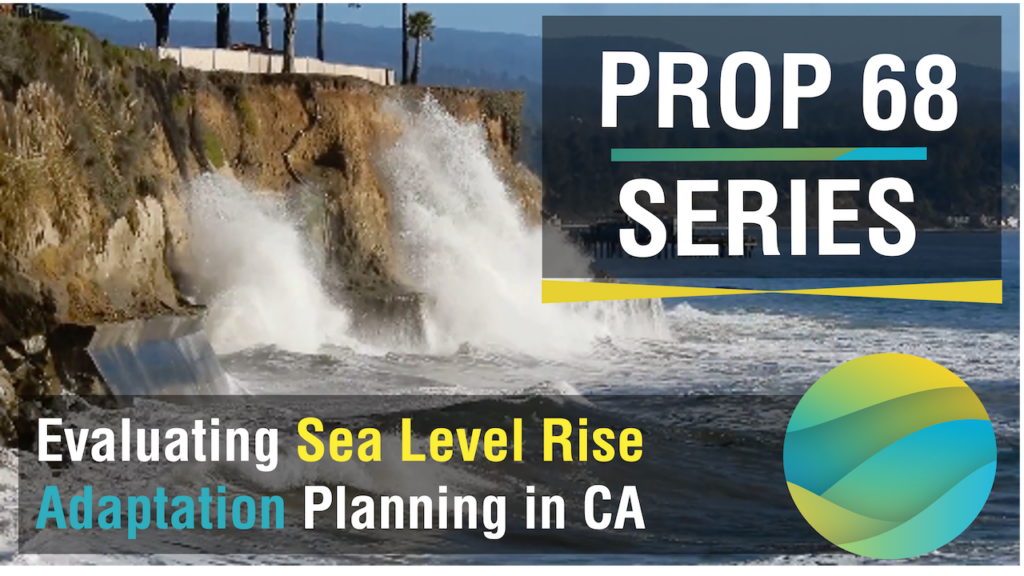Prop 68 Climate Resilience Miniseries Episode 11: Evaluating Sea Level Rise Adaptation Planning in Coastal California
(Intro to the series here)
“I hope we don’t fall into reactionary status quo.. but rather, take some bold steps in planning actions to try to adapt to sea-level rise in ways that might be a good bet.” – Charles Lester
Today we are talking with the University of California Santa Barbara project team leading a statewide evaluation of sea-level rise adaptation planning across California’s 76 coastal jurisdictions. One of the products of this work will be a user-friendly online inventory of adaptation planning occurring throughout the state. The Ocean Protection Council and the Office of Planning and Research are closely tracking the progress of this project and exploring opportunities to align and potentially merge the products from this work with the state’s Adaptation Clearinghouse. 
Applying lessons learned from current and past action, the project team will develop recommendations for improving California’s coastal adaptation planning process, including the Local Coastal Plan policy update process. They will also assess alignment between local plans and the State’s Sea Level Rise Principles, released October 2020.
“I think of California’s coast as a laboratory of sorts, with all of these locations that are really diverse…if we can understand each of these places a little bit better, we might find little nuggets of wisdom about how to do a better job at making decisions,” says Dr. Charles Lester, the Principle Investigator on the project. This project will help California find ways to “plan for the long-term but take meaningful action today…and how do we take those actions today so as not to prejudice or ruin the future for our kids and our grandkids?” adds Lester.
California needs to move away from the “emergency-response” method that has dominated action around coastal resilience to flooding, erosion, storm surges, and sea-level rise and move towards thoughtful long-term planning with adaptation pathways and triggers that keep the ultimate goals developed by each local community in mind.
By evaluating the effectiveness of particular adaptation strategies, this project will help inform future action that factors in a given locality’s values and priorities (e.g. protecting property, preserving sandy beach landscapes, maintaining coastal access and public safety). A huge part of this Prop 68 project is to see how local jurisdictions balance the inevitable tradeoffs associated with SLR planning and projects.
“We expect to find that there is no uniform process for SLR adaptation planning, some jurisdictions may be far along in the process of SLR planning while others may be just beginning to explore opportunities for SLR adaptation planning… and different jurisdictions and communities may have different preferred methods for adapting to SLR… some may accommodate for SLR, others might want to nourish their beaches and protect their shorelines more heavily, and some may want to retreat from the imposing threat altogether,” notes graduate student researcher Caitlin Manley.
To learn more about this project, check out this video!
Resources:
- Ocean and Coastal Policy Center, UC Santa Barbara
- Making California’s Coast Resilient to Sea Level Rise: Principles for Aligned State Action
- Charles Lester – Marine Science Institute Profile, UC Santa Barbara
- California’s Adaptation Clearinghouse – resilientca.org
Credits:
- Video Production, Editing, and Narration: Kat Beheshti
- Drone footage: Charles Lester
- Photos: Charles Lester
- Video Thumbnail Photo: Charles Lester
- Video Footage: Kat Beheshti, Charles Lester
About Dr. Charles Lester: Charles is the Director of the Ocean and Coastal Policy Center within the Marine Science Institute at the University of California, Santa Barbara. He is also the Principle Investigator on this Prop 68 Project. Prior to working at UC Santa Barbara, Charles served the State of California for 20 years as a manager, Deputy Director and ultimately the Executive Director of the California Coastal Commission (2011-2016). He received his BA in Geochemistry from Columbia University, and his JD and PhD in Jurisprudence and Social Policy from the University of California, Berkeley.
About Caitlin Manley: Caitlin is a Graduate Student Researcher at the UCSB and a Master’s Student at the Bren SChool of environment science and management. Caitlin received her BS in Marine Biology and Biological Oceanography from the University of Hawaii at Manoa. Prior to entering graduate school, Caitlin has worked for the Santa Barbara Museum of Natural History and Sea Center, U.S. Fish and Wildlife Service, and the National Parks Service.
About the Author: Dr. Kathryn Beheshti is a 2021 California Sea Grant State Fellow with the Ocean Protection Council’s Climate Change Program. Kat’s own research focuses on understanding the drivers of loss and recovery of key coastal foundation species (e.g. salt marsh plants and seagrasses). Kat is committed to making science accessible to individuals of all ages and demographics. She hosts her own science communication platform, sloughit.com and participates in an interdisciplinary science communication team at SciAll.org, where she is a Lead Vlogger.

